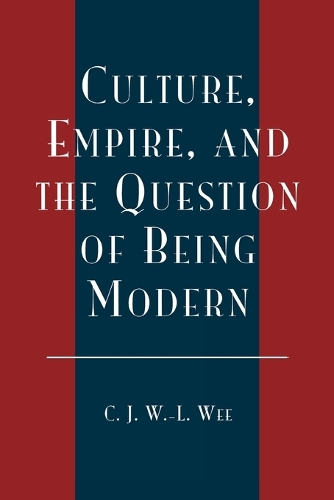
Culture, Empire, and the Question of Being Modern
(Paperback)
Publishing Details
Culture, Empire, and the Question of Being Modern
By (Author) C. J. W.-L. Wee
Bloomsbury Publishing PLC
Lexington Books
8th April 2003
United States
Classifications
Tertiary Education
Non Fiction
Social and cultural anthropology
Colonialism and imperialism
Literary studies: c 1900 to c 2000
306.0942
Physical Properties
Paperback
250
Width 154mm, Height 228mm, Spine 17mm
349g
Description
Culture, Empire, and the Question of Being Modern explores the problematic formation of national culture within modern English society. In this ambitious work of post-colonial and cultural theory, C. J. Wan-ling Wee investigates the complex interaction between a modern, industrialized, metropolitan, and progressively rational English national culture and a nationalistic imperial discourse interested in territorial expansion and the valorization of an idealized agrarian past. Starting with the Victorian era, the work documents the complex relationship of concepts such as "home" and "frontier" and "English and "colonial" through an analysis of key literary-cultural figures in their historical contexts: Rudyard Kipling, Charles Kingsley, T.S. Eliot, and V.S. Naipaul. Wee brings the discussion of modernity into the present with a consideration of post-imperial Singaporea neo-traditionalist modern society that reworks many of the colonial tropes and contradictionsto investigate the ambiguities and contradictions revealed in the West's engagement with modernity.
Reviews
Students and scholars of modern English imperial culture will learn much from this brilliant study of the ways in which empire and colonial encounter shaped a complex and contrapuntal discourse that blurred the boundaries between center and periphery, Enlgish national identity and the colonized Other, and modernity and 'primitiveness.' -- Victor Li, Dalhousie University
Wee's examination of the ideological uses and ruses of "the primitive" . . . as source of exotic desire and of masculine reinvigorization is especially noteworthy. His book is a welcome addition to postcolonial studies of British imperialism and "Englishness." -- Patrick Brantlinger, Indiana University
Mobilizing innovative readings of historically salient texts, Wee shows us a face of Britain often suppresseda 'muscular' domestic nativism that sought to counter rational, progressive visions by finding a home in an atavistic, agrarian past.. . . . This work is strikingly relevant to the contemporary moment when, in a new Europe, appeals to English 'heritage' take on a novel, disquieting significance. -- Jean Comaroff, University of Chicago
Wee envelops discussion of these writers with an opening chapter on national culture, empire, and modernity, and a closing chapter on Singapore as an 'East Asian modernity' where the legacy of national and colonial modernity is being worked out. He has written a valuable contribution to postcolonial studies. His book shows a detailed knowledge of the work of his chosen writers....Wee's work joins that of others who have begun to explore the ways in which experiences of empire interacted with the invention of national culture and identity in the heartlands of imperial Europe. * European Journal Of Communication *
A thought-provoking study on the imbrication of nationhood, modernity, and empire in English culture and beyond. Wee eschews simplistic theoretical models such as that of cultural imperialism, rather seeing English and British identities as fractured and contested by the multiple experiences of empire. In a deft epilogue, the analysis is extended to the problematics of the formation of a national culture in postcolonial Singapore. -- Philip Holden, National University of Singapore
Author Bio
C. J. W.-L. Wee teaches literature and cultural theory at Nanyang Technological University, Singapore.
